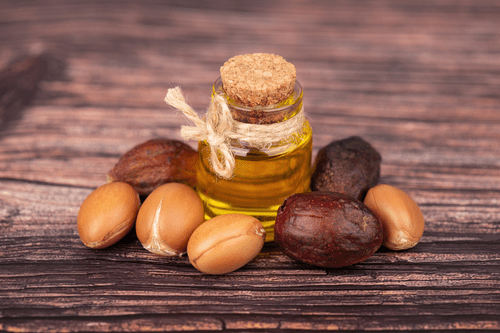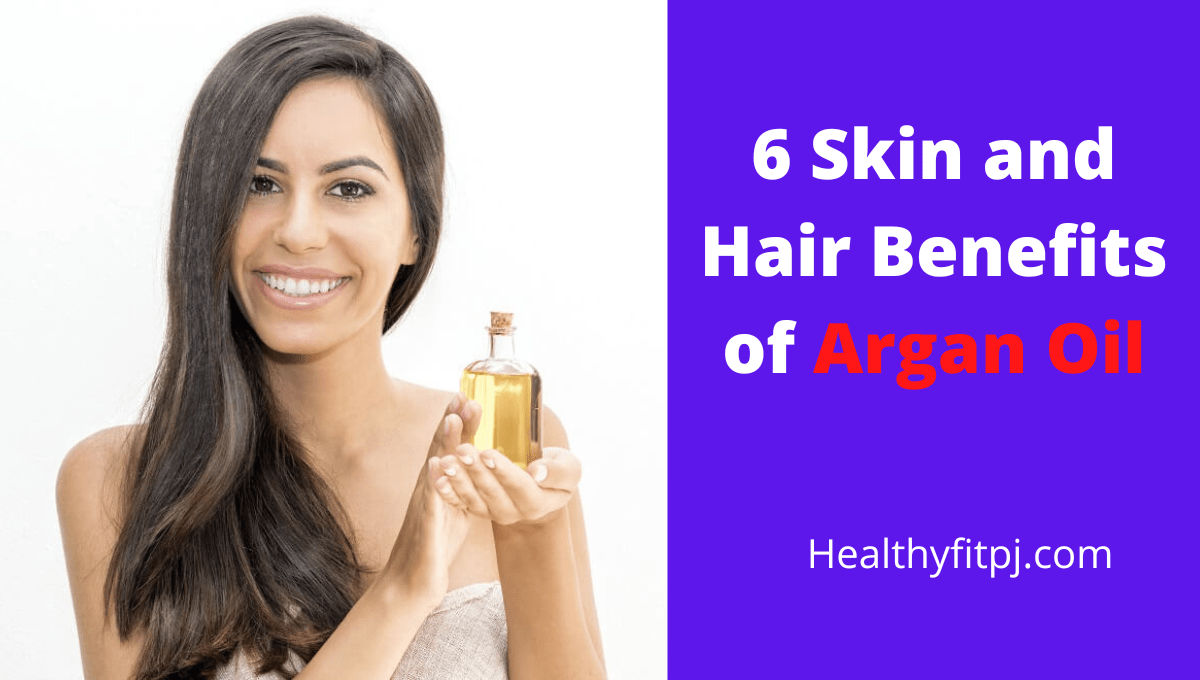You’ve probably spotted argan oil when perusing the drugstore’s beauty section. It’s also for a good purpose. The honey-colored oil, which is derived from a Moroccan native plant, appears to have endless uses, including maintaining velvety smooth skin and hair.
You might be aware of what social media influencers have said about it, but what are the actual health advantages of using this allegedly “liquid gold” and what is the science behind it?
You can learn more about argan oil and how to include it into your beauty routine.
Table of Contents
What is Argan Oil?
Argan trees are indigenous to Morocco, and it is from their nuts that argan oil is derived.
Argan oil is used by people in a variety of ways. While some people use the oil for cooking, others use it to care for their skin and hair. Argan oil can be purchased as an oil or as an ingredient in lotions and shampoos that are used for skin and hair care.
Skin and Hair Benefits of Argan Oil

Despite coming from a tiny kernel, argan oil has powerful health benefits.
It contains moisturising fatty acids like linoleic and oleic acids. Antioxidants and vitamin E are also present, which can guard against free radical damage and breaking.
The following are some benefits of argan oil for skin and hair:
1. Minimizes Frizz Hair
Everyone desires hair that is silky and smooth without any greasy buildup. Because it gives a moisturising boost to reduce frizz while remaining light on your strands, argan oil has become a popular choice for many.
It improves the general condition of your hair while also adding a lighter moisture that won’t weigh it down.
A short application of argan oil to the tips of your hair can hide those annoying split ends, however it won’t make them disappear.
2. Treats a Number of Skin Conditions
Antioxidant and anti-inflammatory qualities are among the many therapeutic benefits of argan oil. Both aid in reducing the signs and symptoms of several inflammatory skin disorders, including rosacea and psoriasis.
Apply pure argan oil straight to psoriasis-affected skin regions for optimum results. Oral supplements might be the most effective way to treat rosacea.
3. Hydrates Your skin
Thanks to its vitamin E and fatty acids, this smooth oil can provide your skin with much-needed moisture, especially if you are prone to dry skin. Argan oil improves overall texture and safeguards the skin’s natural barrier, according to research.
Argan oil may also be your saviour if you suffer from severe dry skin, psoriasis, or eczema.
Those seeking more natural therapies might use it to treat dry, sensitive skin. However, it’s crucial that the oil be free of any additional perfumes or preservatives because those might aggravate conditions like eczema.
Although it might increase your skin’s moisture, this oil won’t do anything to reduce stretch marks or acne scars.
4. May Help with Anti-Aging
Could the “Fountain of Youth” also be argan oil? To be certain, more study is necessary. However, some research suggests that by making the skin more elastic, this oil may have some anti-aging benefits.
5. Protects Against Heat and Styling Damage
Despite how much you may rely on your reliable straightener and hair dryer, it’s crucial to have protection from any harsh styling you may be doing. It turns out that a natural treatment for that can be argan oil.
The oils strengthen hair that has been weakened by excessive heat or chemicals by adding a protective coating to the hair.
Argan oil even enhanced the quality of hair that had had extensive colouring or dyeing, according to a 2013 study.
6. May Help Treat Wounds
Any minor scrapes and scratches may benefit from the application of argan oil.
According to a 2017 assessment, argan oil possesses anti-inflammatory effects, which may make it useful for aggravated burns and wounds.
How to Use Argan Oil
There are numerous applications for argan oil.
The oil can be applied straight to the skin or hair of individuals. To avoid weighing down hair or overburdening the skin, one should start with a tiny amount of oil.
However, a person may want to use a little bit more oil to rehydrate particularly dry regions of their body, including their elbows and heels.
Follow the manufacturer’s instructions if using argan oil-containing skin care or hair care products.
What to Look for When Buying Argan Oil
Here’s how to choose the best kind of argan oil the next time you’re in your neighbourhood beauty supply store. To receive the best benefit from argan oil, try to purchase pure argan oil (often in a dark glass bottle).
This is due to the fact that certain products of argan oil contain a lot of scents and other chemicals that might irritate your skin and hair.
You might be asking, “Should I bathe in this stuff or what?” after hearing about all the advantages. Like with any beauty product, natural or not, start small and observe how your body responds.
Before using it on a larger region of the skin or hair, it is preferable to test it on a tiny area first.
There are several benefits to keeping argan oil on hand in your medicine cabinet, even though you don’t necessarily need to buy it by the case.
This natural oil can be used in a variety of ways, whether you wish to moisturize your skin or soothe frizzy hair.
Frequently Asked Questions
Can I Apply Argan Oil to My Scalp?
You may have heard that using argan oil to keep your scalp hydrated is a good idea. Although this oil is beneficial for your hair.
It might not be the ideal option for your scalp, particularly if you have oilier hair, as these oils can, if overused, encourage seborrheic dermatitis (also known as dandruff).
Is Argan Oil Safe to Consume?
Since some people cook with argan oil, it is safe to eat. However, if someone plans to eat it, they should only buy and utilize argan oil that has been prepared by companies expressly for use in food.
Can Argan Oil Make Hair Grow?
There is currently no scientific proof that argan oil can promote hair growth. Anecdotally, though, some people have discovered that argan oil can make thin, brittle hair feel thicker and healthier.
Conclusion
A versatile substance, argan oil, may aid in hydrating and moisturising both skin and hair.
There is adequate clinical data to suggest that argan oil offers specific benefits for hair, despite the fact that it has been shown to moisturise and promote skin suppleness.
Argan oil, however, may be able to lessen frizz and guard against hair breakage, according to anecdotal data.
Sources:
- https://pubmed.ncbi.nlm.nih.gov/29280987/
- https://www.scirp.org/journal/paperinformation.aspx?paperid=36776
- https://www.ncbi.nlm.nih.gov/pmc/articles/PMC5889864/
- https://pubmed.ncbi.nlm.nih.gov/26978857/
- https://www.ncbi.nlm.nih.gov/pmc/articles/PMC5019162/
- https://www.ncbi.nlm.nih.gov/pmc/articles/PMC4387693/
- https://www.ncbi.nlm.nih.gov/books/NBK459230/
